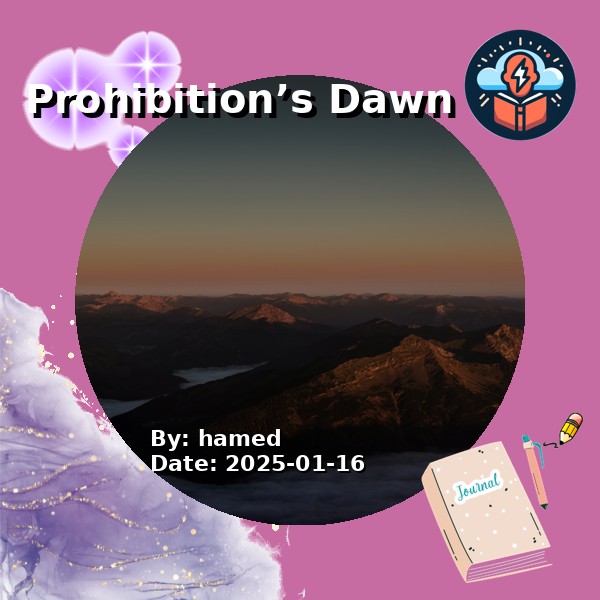It was the sound of the doorbell that made Benny pause. The bell chimed the same way it always did, a soft jingle that brought a sense of warmth to the dimly lit bar. But tonight, that chime felt like an omen—sharp and foreboding.
Benny wiped his hands on the rag, eyes flicking to the doorway as a man in a heavy coat stepped inside. The man’s face was masked with the cold, but his eyes—those eyes—held a glimmer of something Benny didn’t want to see. Trouble.
“You still open, Benny?” the man asked, his voice gruff, clipped.
“Always open,” Benny replied, his own voice sounding strained in the otherwise quiet room. The old mahogany bar gleamed under the flickering candlelight, as though it too were unsure of the changes to come.
It was January 1919, the start of something he could hardly comprehend, something that would unravel everything he had built in this neighborhood for the last twenty years. Prohibition was the law of the land now, the Volstead Act signed into existence, and with it, the end of alcohol—at least legally. Benny had spent his whole life serving whiskey, gin, and rum to men who had stories to tell, customers who never came without their troubles or their laughter. The thought that he’d soon be forced to turn them away, to tell them the drinks he had served with pride were now illegal, twisted something deep inside him.
The man took a seat at the bar, his coat heavy with the weight of the world. Benny didn’t ask for a drink order. He already knew.
“Same as always,” the man muttered, looking around as if the walls might betray them.
Benny reached under the counter, his fingers brushing over the cool metal bottles—gin, rum, whiskey. He hesitated for a second, then picked up a bottle of gin, the smooth glass cold to the touch. He poured a glass, sliding it across the bar without a word.
The man nodded his thanks, a flash of recognition between them as he took the glass in one swift motion.
“It’s going to get real bad, Benny,” the man said, his voice low, as though fearing the walls themselves could be listening. “Ain’t gonna be easy for you. No more bartending, no more business as usual.”
Benny’s hand hovered over the counter, his usual steady grip faltering. He had heard the rumors, of course—how the underground economy would rise, how speakeasies would thrive, how the law would be bent, twisted, and broken by the very people who once sat at this bar in the comfort of daylight. But hearing it spoken aloud, from someone who had seen the writing on the wall, made it real. He wasn’t just losing a job. He was losing a way of life.
“Who says I’ll stop serving?” Benny asked, his voice rougher than he intended. “I’ll just do it differently, that’s all. No law’s gonna tell me how to run my business.”
The man looked at him, a slight smile tugging at the corner of his lips. “You think the cops are gonna turn a blind eye? Or the feds? You think they’re gonna let you slip through the cracks?”
Benny gripped the counter, the cold wood biting into his palms. It felt like everything was closing in—his bar, his livelihood, his freedom. The weight of the law was heavy, but Benny had always known how to read people, how to stay one step ahead of the game. He wasn’t some rookie behind the bar. He was Benny, the guy who’d mixed drinks for politicians, gangsters, and businessmen alike. If anyone knew how to survive, it was him.
“I’ll figure it out,” he said, his voice more certain now. “Always do.”
The man raised his glass, his eyes gleaming with something akin to respect. “I hope so. ‘Cause things are gonna change, Benny. Real fast.”
Benny didn’t answer. Instead, he poured himself a glass of whiskey, staring down into the amber liquid. He clinked his glass against the man’s.
“Here’s to surviving,” Benny said, his voice quiet but resolute.
The man nodded, the unspoken understanding between them hanging thick in the air. Benny wasn’t just toasting to the man’s future. He was toasting to his own.
Prohibition might have outlawed alcohol, but it couldn’t outlaw resilience. It couldn’t outlaw his will to survive, to keep this bar open, to keep pouring drinks, no matter the law. In a world where the government made alcohol illegal, Benny knew that some things—some people—would always find a way to thrive.
Outside, the cold wind howled, carrying with it the whispers of a new world that was already taking shape. But inside, in the dim light of the bar, Benny poured another drink and waited. The storm was coming, but Benny wasn’t done yet. Not by a long shot.
